| YEMEN
Map
Geography
People
Economy Military
About
100,000 deaths in civil war after Syria,
Egypt and Yemen formed in 1958 the United
Arab States and 60,000 Egyptian troops invaded Arab North Yemen
from 1962 to 1967 to fight Arab Yemeni insurgents and Saudi
Arabian troops. Egypt's
use of WMD against Arab Yemenis was the first use of chemical weapons
in the Middle East.
Yemeni stamp, 1963 :
Arab Yemenis fighting Egyptian aggressors :
Arab Yemenis fighting Egyptian aggressors
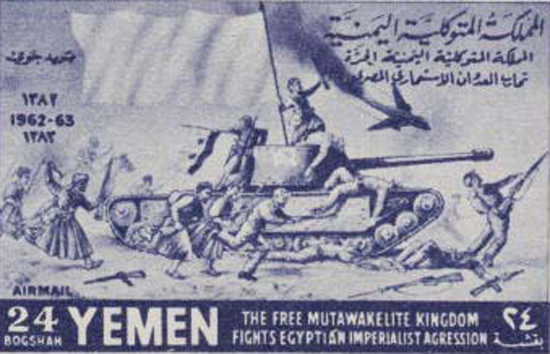 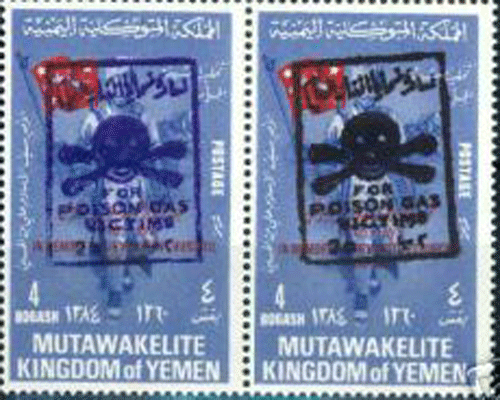
Yemeni stamps,
1967 :
tax benefiting Arab Yemeni poison gas victims massacred by the Arab
Egyptian occupiers | air letter, 1966 :
tax benefiting Arab Yemeni poison gas victims massacred by the Arab
Egyptian occupiers | air letter, 1966  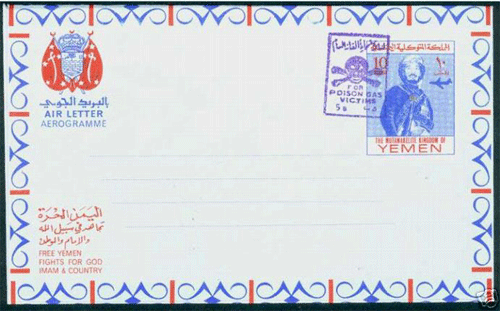
Arab
South Yemen warred against Arab Oman in the 1970s
Civil war in 1994
Since
2004 violent clashes with Zaidi
Shia minority that killed hundreds
Kidnapping
of tourists a useful political tool in the bizarre politics
and a business for the tribesmen
Death
penalty for apostasy
Women can't marry without guardian consent
Most females genitally mutilated during childhood
 Compare
Freedom Score of Yemen (Not Free)
and Israel (Free) Compare
Freedom Score of Yemen (Not Free)
and Israel (Free)
Source: Freedom House (PDF, 187
KB)
 Compare
Human Development Index of Yemen
(0.704) and Israel (0.470) (PDF,
670 KB) Compare
Human Development Index of Yemen
(0.704) and Israel (0.470) (PDF,
670 KB)
Source: United Nations Human
Development Report 2003
 Compare
Corruption Index of Yemen (2.8),
Israel (7.3), Germany (7.3) and USA (7.7) Compare
Corruption Index of Yemen (2.8),
Israel (7.3), Germany (7.3) and USA (7.7)
Source: Transparency International (PDF,
1.8 MB)
 Human
Rights Watch Report 2002 (Yemen): "A
new law of associations took effect in February 2001, empowering
the Ministry of Labor and Social Affairs to supervise nongovernmental
organizations (NGOs) ... Penalties for violating
any of the law's provisions entailed prison sentences of up to one
year and penalties up to YR 100,000 (U.S. $600) ... The
government restricted access to the Internet
indirectly by monopolizing service and keeping prices prohibitively
high ... offenses carried the death
penalty, among them armed banditry, apostasy,
rape, and treason ... Women continued
to face discrimination in personal status law. Only a male guardian
could contract marriage for women who had no way to give meaningful
consent." Human
Rights Watch Report 2002 (Yemen): "A
new law of associations took effect in February 2001, empowering
the Ministry of Labor and Social Affairs to supervise nongovernmental
organizations (NGOs) ... Penalties for violating
any of the law's provisions entailed prison sentences of up to one
year and penalties up to YR 100,000 (U.S. $600) ... The
government restricted access to the Internet
indirectly by monopolizing service and keeping prices prohibitively
high ... offenses carried the death
penalty, among them armed banditry, apostasy,
rape, and treason ... Women continued
to face discrimination in personal status law. Only a male guardian
could contract marriage for women who had no way to give meaningful
consent."
 Report
on Female Genital Mutilation, Yemen (U.S. Department of State, Jun
1, 2001): Report
on Female Genital Mutilation, Yemen (U.S. Department of State, Jun
1, 2001):
"... 96 percent of women in Hodeidah, Hadraumaut and Al-Maharah
had undergone this procedure, while Aden and Sana'a city were 82
percent and 45.5 percent, respectively."
 Pictures
of Female Genital Mutilation (FGM), 2002 Pictures
of Female Genital Mutilation (FGM), 2002
(These pictures are not suitable for children. They
are extremely disturbing!!!)
 The
World Medical Association Statement on Female Genital Mutilation,
Oct 1993: “The World
Medical Association condemns the practice of genital mutilation
including circumcision where women and girls are concerned and condemns
the participation of physicians in the execution of such practices.” The
World Medical Association Statement on Female Genital Mutilation,
Oct 1993: “The World
Medical Association condemns the practice of genital mutilation
including circumcision where women and girls are concerned and condemns
the participation of physicians in the execution of such practices.”
 Policy
Statement | Female Genital Mutilation (American Academy of Pediatrics,
PEDIATRICS Vol. 102 No. 1 Jul 1998, pp. 153-156): “...
pediatricians and pediatric surgical specialists should be aware
that this practice [FGM] has serious,
life-threatening health risks for children and women. The AAP opposes
all forms of FGM …” [Disturbing
graphical descriptions included] Policy
Statement | Female Genital Mutilation (American Academy of Pediatrics,
PEDIATRICS Vol. 102 No. 1 Jul 1998, pp. 153-156): “...
pediatricians and pediatric surgical specialists should be aware
that this practice [FGM] has serious,
life-threatening health risks for children and women. The AAP opposes
all forms of FGM …” [Disturbing
graphical descriptions included]
 Just
a Little Gun Battle, No Big Deal: "Sheikh Abdullah bin
Hussein al-Ahmar, Speaker of Parliament and Chairman of Islah Party,
says the shootout between his sons and police in Sana'a last Sunday
is no big deal," the Yemen Times reports. Al-Ahmar "describes
the incident as 'a normal accident,' pointing out in press statements
that some people in the government have tried to make a mountain
out of a molehill." As many as four men died in this minor
tiff. Just
a Little Gun Battle, No Big Deal: "Sheikh Abdullah bin
Hussein al-Ahmar, Speaker of Parliament and Chairman of Islah Party,
says the shootout between his sons and police in Sana'a last Sunday
is no big deal," the Yemen Times reports. Al-Ahmar "describes
the incident as 'a normal accident,' pointing out in press statements
that some people in the government have tried to make a mountain
out of a molehill." As many as four men died in this minor
tiff.
 Country
Reports on Human Rights Practices, Yemen - 2001 (Bureau of Democracy,
Human Rights, and Labor of U.S. Department of State):
"Prison
conditions are poor and do not meet internationally recognized standards.
Prisons are overcrowded, sanitary conditions are poor, and food
and health care are inadequate.
Inmates depend on relatives for food and medicine. Many inmates
lack mattresses or bedding. Prison authorities often exact bribes
from prisoners or refuse to release prisoners who have completed
their sentences until family members pay a bribe.
Tribal leaders misuse the prison system by placing "problem"
tribesmen in jail, either to punish them for noncriminal indiscretions
or to protect them from retaliation or violence motivated by revenge.
Authorities in some cases arrest without charge and imprison refugees,
persons with mental disabilities, and illegal immigrants and place
them in prisons with common criminals. Conditions
are equally poor in women's prisons, where children likely are incarcerated
along with their mothers. By custom and preference, babies born
in prison generally remain in prison with their mothers.
At times female prisoners are subjected to sexual harassment and
violent interrogation by male police and prison officials. The
law requires male members of the families of female prisoners to
arrange their release; however, female prisoners regularly are held
in jail past the expiration of their sentences because their male
relatives refuse to authorize their release due to the shame associated
with their alleged behavior. ... Some
tribes seek to bring their political and economic concerns to the
attention of the Government by kidnaping and holding hostages. Foreign
businessmen, diplomats, and tourists are the principal targets." Country
Reports on Human Rights Practices, Yemen - 2001 (Bureau of Democracy,
Human Rights, and Labor of U.S. Department of State):
"Prison
conditions are poor and do not meet internationally recognized standards.
Prisons are overcrowded, sanitary conditions are poor, and food
and health care are inadequate.
Inmates depend on relatives for food and medicine. Many inmates
lack mattresses or bedding. Prison authorities often exact bribes
from prisoners or refuse to release prisoners who have completed
their sentences until family members pay a bribe.
Tribal leaders misuse the prison system by placing "problem"
tribesmen in jail, either to punish them for noncriminal indiscretions
or to protect them from retaliation or violence motivated by revenge.
Authorities in some cases arrest without charge and imprison refugees,
persons with mental disabilities, and illegal immigrants and place
them in prisons with common criminals. Conditions
are equally poor in women's prisons, where children likely are incarcerated
along with their mothers. By custom and preference, babies born
in prison generally remain in prison with their mothers.
At times female prisoners are subjected to sexual harassment and
violent interrogation by male police and prison officials. The
law requires male members of the families of female prisoners to
arrange their release; however, female prisoners regularly are held
in jail past the expiration of their sentences because their male
relatives refuse to authorize their release due to the shame associated
with their alleged behavior. ... Some
tribes seek to bring their political and economic concerns to the
attention of the Government by kidnaping and holding hostages. Foreign
businessmen, diplomats, and tourists are the principal targets."
 Death
Tolls for the Man-made Megadeaths of the 20th Century (Yemen) Death
Tolls for the Man-made Megadeaths of the 20th Century (Yemen)
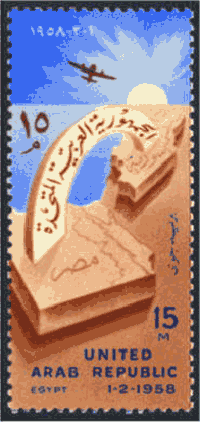   United
Arab Republic (Columbia Encyclopedia, June 6,
2004): Political union (1958-61) of Egypt
and Syria. The capital was Cairo. As an initial
step toward creating a pan-Arab union, the republic abolished Syrian
and Egyptian citizenship, termed its inhabitants Arabs, and called
the country “Arab territory.” It considered the Arab
homeland to be the entire area between the Persian Gulf and the
Atlantic coast. With Yemen
(North Yemen), it formed (1958) a loose federation called the United
Arab States United
Arab Republic (Columbia Encyclopedia, June 6,
2004): Political union (1958-61) of Egypt
and Syria. The capital was Cairo. As an initial
step toward creating a pan-Arab union, the republic abolished Syrian
and Egyptian citizenship, termed its inhabitants Arabs, and called
the country “Arab territory.” It considered the Arab
homeland to be the entire area between the Persian Gulf and the
Atlantic coast. With Yemen
(North Yemen), it formed (1958) a loose federation called the United
Arab States .
In 1961, Syria withdrew from the union after a military coup, and
Yemen soon followed, thus ending the union. Egypt continued to use
the name until 1971. .
In 1961, Syria withdrew from the union after a military coup, and
Yemen soon followed, thus ending the union. Egypt continued to use
the name until 1971.
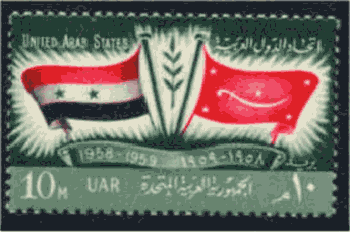
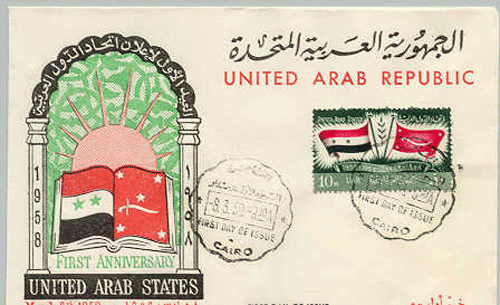
 CIA
World Factbook (Yemen) CIA
World Factbook (Yemen)
|

